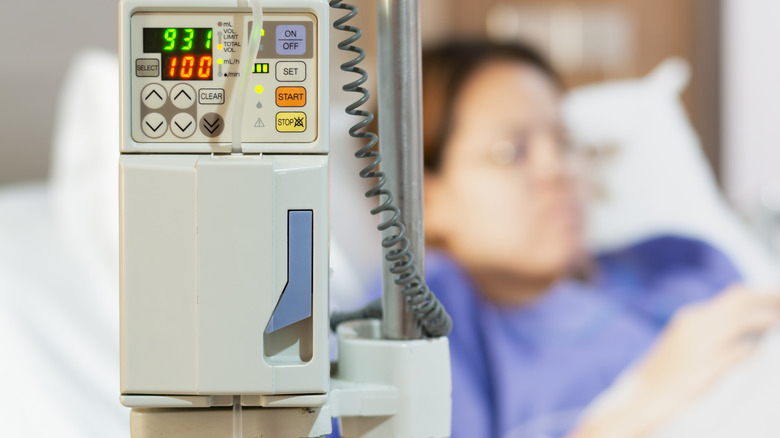When You Go Under Anesthesia, This Is What Happens To Your Body
Anesthesia is one of the most commonly used treatments in today's surgeries, but many people don't know what really happens to their bodies when they go under. First, it's important to know that there are three main types of anesthesia – general anesthesia, IV or monitored sedation, and local or regional anesthesia — which are all designed to keep you comfortable and pain-free during surgery and other medical procedures. According to the American Society of Anesthesiologists, general anesthesia involves complete sedation that makes you lose consciousness. IV or monitored sedation is most commonly used for smaller procedures or medical tests like colonoscopies and may involve mild or deep sedation. Lastly, local or regional anesthesia is used to numb a specific part of the body, but the patient stays conscious throughout the procedure.
The term "going under" in reference to anesthesia refers to the first two types. Most commonly used medicines in anesthesia include propofol, etomidate, and ketamine, with some adjacent, supplemental compounds. These medicines also influence some of the side effects of anesthesia for the way they're absorbed in the body.
Your brain goes into a state similar to sleep
When you think of anesthesia, you may immediately think of sleep. And indeed, going under anesthesia does make your brain go into a state that's similar to sleep — but not exactly like sleep. Bruno van Swinderen, an associate professor from the University of Queensland in Australia set out to explain this phenomenon through a study published in Cell Reports. The professor along with other researchers found that propofol, one of the most commonly used medicines in anesthesia, affects communication between neurons throughout the brain in a way that's different than being asleep. It restricts the movement of a key protein which consequently lowers communication between brain neurons, making you feel drowsy, sleepy, and even groggy after you wake up.
"We think that widespread disruption to synaptic connectivity — the brain's communication pathways — is what makes surgery possible, although effective anesthetics such as propofol do put you to sleep first. Still, it's difficult to study in humans," van Swinderen told Healthline.
During sleep, your brain goes through four to six cycles of REM and non-REM phases. During anesthesia, your brain does not perform these cycles. However, Dr.Jennifer Kollman, director of anesthesia at UCHealth Memorial Hospital Central in Colorado Springs, Colorado, told The Healthy, "Some people even report dreams afterward."
You may experience a dip in blood pressure
The initial dosing of anesthesia is usually based on your weight, and no two people receive the exact same amount of medicine. "Giving a falsely low weight may lead to underdosing of both anesthetics and antibiotics," Dr. Nitin Sekhri, medical director of pain management at Westchester Medical Center in Valhalla, New York, told The Healthy. "And giving a falsely elevated weight may lead to a higher-than-needed anesthetic dose, which could dangerously drop one's blood pressure." That's why it's so important to be clear about your weight or even request a scale at the hospital to be completely accurate.
Nevertheless, it is normal for blood pressure to change throughout surgery. It can be a result of "the activation of your sympathetic nervous system during the start of anesthesia," according to Verywell Health. Additionally, your blood pressure can drop if you lose blood during surgery. This is usually balanced out by adding more fluids or a blood transfusion.
You may have digestive issues and breathing problems if you didn't fast before surgery
The usual rule of thumb is to avoid food and drinks before a surgery involving general anesthesia. Some procedures may even be postponed if this rule was broken. There are many reasons why you should avoid ingesting anything before surgery, and the main ones concern your digestion and breathing.
Having food in your stomach can cause infection and inflammation, nausea, vomiting, and even aspiration (via UCLA Health). While you're under anesthesia, you lose your ability to cough, which leaves your breathing airways open and not protected from having stomach contents enter your lungs, according to Verywell Health. This can cause severe infection and inflammation of the lungs, leading to pneumonia. That's why it's crucial to adhere to the guidelines provided to you by your doctor and surgery team, so you can prevent any possible complications from threatening your health.
Some procedure prerequisites even require cleansing of the entire digestive tract using a colonic lavage solution. This will cause you to completely clean out your bowel and prep it for surgery or invasive tests like colonoscopy.
Bleeding is a potential side effect depending on the medications you take
Depending on the medications and supplements you take, your doctor may ask you to stop taking them before you're scheduled to go under anesthesia. It's extremely important to let your doctor and anesthesiologist know when you took your last dose, as it may change their approach or postpone the procedure to keep you safe. "If you were told to stop your blood thinner on Friday and you forgot and did not do it until Monday, say something," Dr. Steven L. Mandel, an anesthesiologist at the Ketamine Clinics of Los Angeles in California, urged when speaking to The Healthy.
The most common medications to abstain from include monoamine oxidase inhibitors (MAOIs), blood thinners, and ibuprofen, as well as supplements like omega-3s and ginkgo biloba. Additionally, your doctor will ask you to abstain from taking medications that need to be taken with food, as ingesting food and drinks is usually strictly prohibited.
You may shiver and get goosebumps
One of the most common side effects of anesthesia is a lowered body temperature. This in turn can cause shivering and goosebumps, even while you're completely under. And it can persist even after you wake up, according to The Royal College of Anaesthetists. During surgery, this side effect might appear as if the patient was waking up and becoming conscious of their surrounding, when in fact it's just the body's response to a drop in body temperature.
Thankfully, the shivering should subside within a half-hour of waking, per Critical Care Partners. Sometimes, certain medications are used to treat shivering post-op. "The combination of forced-air warming devices and intravenous meperidine is the most validated method" of treating shivering after anesthesia use, according to a report in the Romanian Journal of Anaesthesia and Intensive Care. Nevertheless, it is generally considered best to wait until the shivering stops on its own.
You may be dehydrated
Proper hydration is extremely important for your overall health and wellbeing, regardless of your current health conditions. It helps with body temperature regulation, lubrication of the joints, nutrient absorption, and infection prevention. And when it comes to exact amounts, the "8 glasses of water" rule seems to be outdated. Experts tend to agree on 11 cups of water for women and 16 cups for men as the average to strive for (via Mayo Clinic).
However, since you're usually advised not to eat or drink anything before a surgical procedure, there is a risk of experiencing dehydration, according to The Healthy. That's why staying well-hydrated for several days before the procedure is important. It's recommended to drink mostly clear liquids and prioritize drinking enough water after your surgery in order to combat any potential symptoms of dehydration and prevent them from causing further issues during your recovery.
You can experience constipation
Anesthesia can lead to constipation, even if your bowel habits were regular before surgery. "Some types of anesthesia will slow down the GI system, so it is more difficult for food to be passed through your body," Dr. Constance Chen, board-certified plastic surgeon and breast reconstruction specialist, told Romper. "This can lead to people being constipated after anesthesia, especially if they are taking narcotics postoperatively that also contribute to slowing down the GI system." This is also one of the reasons why fasting before your surgery is beneficial.
To help curb post-op constipation, try drinking more water, avoiding caffeine, adding more fiber into your diet, and increasing your level of movement, if possible (via WebMD). Still, constipation can be a serious issue and cause complications down the road. These include hemorrhoids, rectal bleeding, fissures, and even more severe conditions like rectal prolapse. Constipation shouldn't be taken lightly and may call for medical intervention.
You may have nausea
Nausea and vomiting are very common side effects of anesthesia. In fact, these side effects are known under the name "postoperative nausea and vomiting" (PONV), according to a report published in Anesthesiology Research and Practice. PONV can be caused by certain medications and dehydration, according to Verywell Health. Your doctor may even prescribe you medication before the surgery to lower the possibility of you experiencing PONV.
Even though these side effects don't seem very serious, the condition can lead to dehydration, pain, and other problems that can impact your recovery and healing. Some of the most effective tips in preventing PONV include taking precautions with your food and drinks after waking up from anesthesia, slowing down, not lying down after your meal, and sucking on hard candies (via UCLA Health). Nausea and vomiting are never pleasant, but if you prepare for the possibility of experiencing them beforehand, you'll hopefully be able to mitigate some discomfort.
You might experience temporary memory loss
Temporary amnesia is a side effect that can accompany anesthesia (via Medical News Today). Some people are even unable to remember whole conversations leading up to the surgery, an article in The BMJ revealed. This memory loss is usually a pretty benign side effect caused by the medications used in anesthesia, but it may be a cause of stress for patients.
Not being able to remember just one single detail about your day can cause you to go down a spiral of anxious thoughts — let alone hours or days leading up to the procedure. Most patients who experience this side effect experience issues with their short-term memory before the procedure, but some may struggle with recalling new short-term memories that happened on the day they woke up, according to a report in Anesthesia & Analgesia.
However, knowing that this is temporary may help lower your stress over amnesia. Having an open and honest conversation with your doctor about it is arguably the best way to prevent anxiety and panic after waking up and not remembering how you even got to the hospital.
You could be confused or delirious
Confusion can occur after surgery, especially in the first few hours after you wake up (via Verywell Health). Usually, the reasons include medications, poor sleep due to pain management, and low oxygen levels, but sometimes, the cause can be an infection.
Confusion can also tie in with memory loss and get exacerbated by the anxiety and fear that follow. Stress-reducing techniques like meditation and breathing exercises, as well as specific medications, may help reduce anxiety and relieve the symptoms.
However, in some cases, the confusion may be more severe. Older adults are more prone to post-operative delirium, according to Medline Plus. And even though it typically resolves in time, it can be distressing. "Most cases of delirium last a week or less, with symptoms that gradually decline as the patient recovers from surgery," UT Southwestern Medical Center explained. "However, the condition can last for weeks or months in patients with underlying memory or cognitive challenges such as dementia, vision, or hearing impairment, or a history of post-operative delirium."
Your muscles may twitch or you may get the hiccups
Muscle spasms, or twitching, as well as the hiccups are also possible side effects of going under anesthesia, according to a report in the Journal of Anaesthesiology Clinical Pharmacology. And even though it may look like the person is waking up, it's just the body responding to anesthesia. Propofol, one of the most commonly used drugs in anesthesia, is the usual culprit for this side effect. "This usually resolves quite quickly," Dr. Constance Chen, board-certified plastic surgeon and breast reconstruction specialist, told Romper.
In the event that you do experience muscle spasms during surgery, rest assured that your surgical team is well-equipped to deal with them. They may administer muscle relaxers to keep you still during surgery and monitor you throughout the entire procedure, according to a report published in the journal Medicine. In rare cases, these muscle twitches or hiccups may continue even after the patient has woken up.
Although rare, you could wake up
Probably one of the scariest thoughts one can have before going under anesthesia is waking up during surgery. And even though it's really rare — it happens in one or two out of a thousand cases, according to the American Society of Anesthesiologists – it can happen. In the majority of cases, waking up during surgery, also called anesthesia awareness, creates more anxiety and confusion than anything else, as the patient usually does not feel pain.
Citing, Dr. James Lozada, a fellow in obstetrical anesthesiology at the Northwestern University Feinberg School of Medicine in Illinois, Healthline explained that anesthesia awareness is "more common in procedures when the patient is unstable, such as trauma-related surgeries, emergency cesarean section operations, or those that require lower doses of medication to safely treat the patient."
The American Society of Anesthesiologists recommends telling your surgeon if you have a history of anesthesia awareness or drug or alcohol use. You should also express your concerns about your upcoming surgery and let your medical team know which medications or supplements you take.
Complications and rare side effects
Every person is different, and so is their anesthesia experience. Some may experience less common side effects, like headaches, vivid hallucinations and dreams, as well as issues with urination, according to a report in Anesthesia: Essays and Researches. Additionally, some people may experience more severe complications that have been tied to anesthesia. These include malignant hyperthermia or cognitive issues that can persist longer than a few months.
The development of side effects the way they affect you depends on a myriad of factors, some of which include your family history, especially if anyone in your family is known to be allergic to anesthesia medication; your health and medical history (severe diseases, prior surgeries and reactions to anesthesia, as well as mental health conditions); medications you take; your lifestyle choices, such as diet, exercise (or lack thereof), smoking, and abuse of drugs or alcohol; and the extent and duration of your surgery (via Healthline). While some surgeries may last a half-hour, others might require you to be under anesthesia for a very long time.













